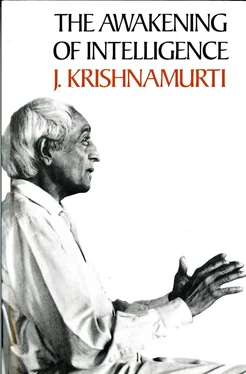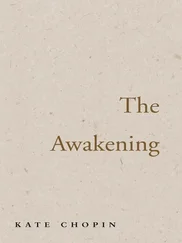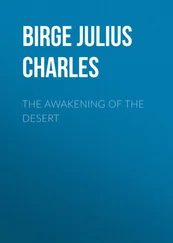KRISHNAMURTI: What is its relationship to good—good being all that we have said? This is a real intent to hurt people.
Naudé: Organised disorder, one might say.
KRISHNAMURTI: Organised disorder, which is the organised disorder of a society that rejects the good. Because the society is me. I am the society; if I don’t change, society cannot change. And here is the deliberate intention to hurt another, whether it is organised as war or not.
Naudé: In fact, organised war is the group manifestation of the phenomenon you are speaking about in India, putting the thorns through the little statues.
KRISHNAMURTI: This is well known, this is as old as the hills. So I am saying this desire to hurt, consciously or unconsciously, and yielding to it, and giving it sustenance, is what? Would you call that evil?
Naudé: Of course.
KRISHNAMURTI: Then we shall have to say that will is evil.
Naudé: Aggression is evil. Violence is evil.
KRISHNAMURTI: Wait, see it! Will is evil, because I want to hurt you.
Naudé: Someone might say though: the will to do you good—is that will also evil ?
KRISHNAMURTI: You cannot will to do good. Either you are good, or not good, you can’t will goodness. Will being the concentration of thought as resistance.
Naudé: Yes, you said that goodness is the absence of a blueprint.
KRISHNAMURTI: So I am asking: is evil related to the good, or are the two things totally apart? And is there such a thing as absolute evil? There is absolute good, but absolute evil cannot exist. Right?
Naudé: Yes, because evil is always cumulative, it is always to some degree or another.
KRISHNAMURTI: Yes. So a man with the deep intention to hurt another—some incident, some accident, some affection or care, might change the whole thing. But to say that there is an absolute sin, absolute evil, is the most terrible thing to say. That is evil.
Naudé: The Christians have personified evil as Satan and as an almost immutable force, almost equal to the good, almost equal to God. The Christians have enthroned evil almost eternally.
KRISHNAMURTI: Look, Sir. You have seen those bushes in India, they have got long thorns, nearly two inches long.
Naudé: Yes.
KRISHNAMURTI: There are snakes which are poisonous, deadly poisonous, there are other things which are frighteningly cruel in nature, like the white shark, that appalling thing we saw the other day. Is that evil?
Naudé: No.
KRISHNAMURTI: No?
Naudé: No, Sir.
KRISHNAMURTI: It is protecting itself: the thorn is protecting itself against the animal so that the leaves are not eaten.
Naudé: Yes and so is the snake.
KRISHNAMURTI: So is the snake.
Naudé: And the shark is following its nature.
KRISHNAMURTI: So see what it means. Anything that is self-protective in the physical sense is not evil. But protecting oneself psychologically, resisting any movement, leads to disorder.
Naudé: If I may interrupt here. This is the argument which many people use about war. They say that building up an army and using it, for instance, in South East Asia is the kind of physical protection which the shark . . .
KRISHNAMURTI: That is too absurd an argument. The whole world is divided up for psychological reasons as “my country” and “your country”, “my God” and “your God”—that and economic reasons are the cause of war, surely? But I am trying to get at something different. Nature is terrible in certain ways.
Naudé: Ruthless.
KRISHNAMURTI: We human beings looking at it say, “That’s evil, how terrible”.
Naudé: Lightning.
KRISHNAMURTI: Earthquakes which destroy a thousand people in a few seconds. So the moment we assert that there is absolute evil, that very assertion is the denial of the good. Goodness implies total abnegation of the self. Because the “me” is always separative. The “me”, “my family”, the self, the person, the ego, is the centre of disorder, because it is a divisive factor. The “me” is the mind, is thought. And we have never been able to move away from this egocentric activity. To move completely away from it is complete order, freedom, goodness. And to remain in the circle of self-centred movement breeds disorder; there is always conflict there. And we attribute this conflict to evil, to the devil, to bad karma, to environment, to society; but the society is me and I have built this society. So unless this “me” is totally transformed, I am always contributing, to a major extent or to a minor extent, to disorder.
Order means behaviour in freedom. And freedom means love and not pleasure. When one observes all this one sees very clearly that there is a marvellous sense of absolute order.
MALIBU, CALIFORNIA
28 MARCH 1971
Конец ознакомительного фрагмента.
Текст предоставлен ООО «ЛитРес».
Прочитайте эту книгу целиком, купив полную легальную версию на ЛитРес.
Безопасно оплатить книгу можно банковской картой Visa, MasterCard, Maestro, со счета мобильного телефона, с платежного терминала, в салоне МТС или Связной, через PayPal, WebMoney, Яндекс.Деньги, QIWI Кошелек, бонусными картами или другим удобным Вам способом.












